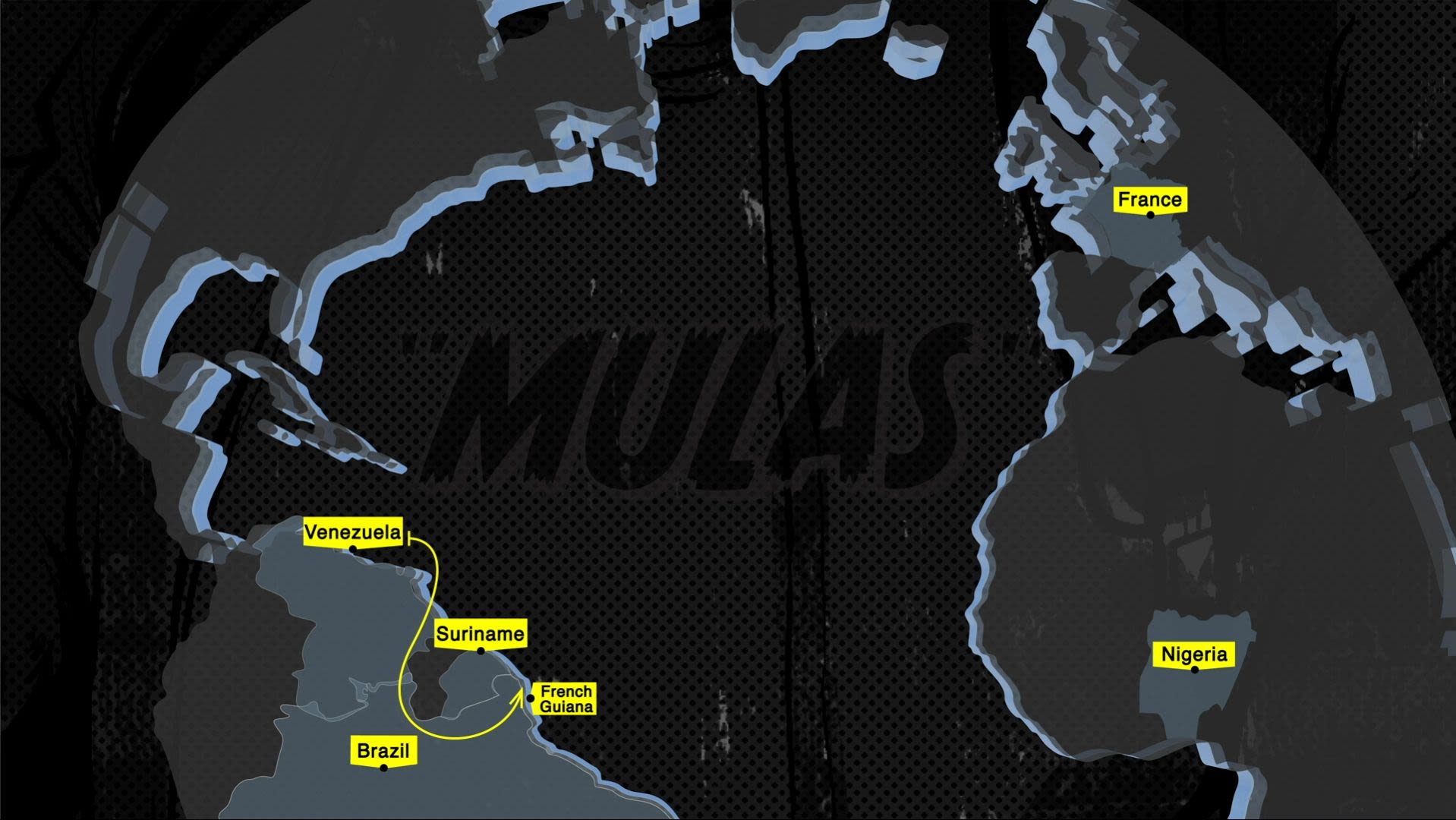A NIGERIAN NETWORK
RECRUITS VENEZUELANS
TO TRANSPORT DRUG TO EUROPE

At the beginning of 2020, two Venezuelans were arrested in Paris for carrying hundreds of finger cots containing cocaine. Because of this, a transnational network of drug trafficking that uses “mules” and connects five countries (Venezuela, Brazil, Suriname, French Guiana, Nigeria, and Europe) is now under the spotlight.
“Food. Food is the reason I am here. I made this trip for food. I was going through a difficult time,” said Marvin,* a native from Caracas with three small children who was offered US$ 5,000 to carry drugs to Europe.
During an interview with ARI journalists in Paris, Marvin mentioned that this drug trafficking organization is led by Nigerians.
Organized crime groups have taken advantage of the Venezuelan complex humanitarian emergency, which has plunged 80% of its population into extreme poverty. They recruit vulnerable workers for their illegal activities.
Since 2018, the recruitment of Venezuelans by Colombian guerilla groups, Brazilian drug trafficking gangs, or Mexican human trafficking networks has been reported. Nonetheless, the presence of a Nigerian mafia within this criminal ecosystem that roams the helpless population is definitely a striking finding. This also evidences a pattern identified through this investigation.
Joe,* the other Venezuelan arrested in France at a different date and place than Marvin, also traveled driven by his financial situation.
Joe stated that Brazil is the home base of the Nigerian criminal group. This is where drug mules are prepared and recruited. Drug mules are individuals who transport small amounts of drugs from one country to another one.
Because of their vulnerable condition, Venezuelans, particularly women, are attractive prospects for drug trafficking organizations.
Alba* is a Venezuelan immigrant who arrived to Boa Vista with her three children searching for better living conditions. After ten days, she ran out of money to pay rent. The hotel owner where she was staying at the time was Nigerian. In order to help her solver her economic difficulty, he suggested her to make a trip, just like Marvin and Joe did, to transport drugs to Amsterdam.
Alba, who is forty-two years old, was initially prepared at the Acceso Rapido Hotel located in Boa Vista, capital city of the Brazilian state of Roraima. At different times, Marvin and Joe, the Venezuelans recruited in Caracas and arrested in Paris, were also prepared here.
Even though drug trafficking within the organization is rarely used by big cartels since they mostly use vessels, narco submarines, and planes, this mode is still preferred by small but powerful criminal structures that benefit from the vulnerability of potential candidates who transport drugs.
According to reports of the Police Community of the Americas (AMERIPOL), diverse criminal gangs from West Africa, mainly led by Nigerians, have established cocaine trafficking in many Western countries. Some have done so in Brazil to export this drug to Africa and Europe.
Based on a report of the Latin American Faculty of Social Sciences (FLACSO by its Spanish acronym) published in the Latin American Journal of Security Studies (URVIO by its Spanish acronym), Nigerian groups control almost 90% of the drug shipped by air from Brazil to Africa through mules and other methods.
Through this investigation, a small Nigerian community was identified in Caracas. They live and are related to evangelical churches Venezuelans attend to. After Sunday service, followers are given food, and on Tuesdays the religious service is only for women.
No relationship was found between the leaders of these churches and the drug trafficking network. Nevertheless, an ARI team in Brazil determined some ties between the criminal group’s leaders and Venezuela.
Kevin Muroof Ezequiel Salami, the Nigerian leader of the group in Boa Vista, owns the Acceso Rapido Hotel that is used to house individuals who ferry drugs. He is also the pastor and president of an evangelical church. He was in Venezuela before he arrived to Brazil.
Mike is the other Nigerian who lived in Caracas and controls the group’s operation in Suriname.
The three Venezuelans featured in this story do not know each other. Given the time they were recruited, they likely coincided at some point during their journey through Brazil, Suriname, French Guiana, or Paris. The ARI team located each of them during this investigation.
COMIC
VENEZUELANS
WHO TAKE DRUGS TO PARIS
Marvin* is an unemployed man from Caracas with 3 children. He agreed to bring drugs to Europe for a Nigerian group and spent several months in a Paris prison. He hasn't seen his family for almost 2 years

REPORTAGE
BRAZIL, THE EPICENTER OF THE TRAFFICKING OPERATION TO EUROPE
The Nigerian drug network operates from Brazil. Alba*, a Venezuelan who emigrated to that country with her children, ran out of money for rent. His landlord suggested he go as a "mule" to Europe

VIDEO
DEATH OR PRISON:
THE FATE OF DRUG INTERNS
Joe* wandered the streets of Paris penniless until a few months ago. He was recruited by the same Nigerian network. He thought that traveling with finger cots would be easy, but he was arrested in France

CHRONICLE
THE NIGERIAN
MAFIA REACHES VENEZUELA
The 3 Venezuelans in this story do not know each other. They were captured in different places and dates by the so-called new "Nigerian Mafia", which operates in South America and Europe. In Venezuela there are Nigerian churches, but no link was found with the criminal network

The Land, Work and Citizenship Institute (ITTC), a Brazilian organization that promotes human rights with a focus on gender inequality and incarceration, recorded 57 Venezuelan women imprisoned for drug trafficking in the city of Sao Paulo, between 2008 and 2019.
Since 2015, there has been an increase in the arrest of Venezuelan migrants for drug trafficking in the registry of this organization. This fact coincides with the worsening of the Venezuelan economic crisis. The year with the most arrests reported by this data is 2017, with 23.
“From 2015 to 2019, we identified at least 10 cases with elements of human trafficking. In other words, of the 48 Venezuelan women interviewed in the period, at least 21% were victims of human trafficking,” the document details.
The ITTC researchers explained that some Venezuelans said that they were captured in places and situations in which their vulnerability was evident. For example, soup kitchens where they attend after losing their jobs.
The report indicates that a large part of Venezuelan women are captured by criminal groups led by Nigerians.
The average age of Venezuelan detainees registered by the ITTC is 31 years, 64% are mothers and 54% are responsible for the home. 79% were detained while trying to leave Brazil and 86% of the apprehensions occurred at airports.

CREDITS
Investigation and Drafting: Ana Khan - Andreína Mujica - Emily Costa - Grisha Vera - Ronna Rísquez
Illustrations: Ricardo Sanabria
Photography: Andreína Mujica
Video: Ángel Colmenares
Edition: Loly Añez
Infographic and Design: Carlenys Zapata - Carmen Riera - Elsy Torres
Social media: Emilay Placencia - Luis Miquilena - Nahir García
Investigation Coordination: Ronna Rísquez
General Coordination: Lisseth Boon
October 2021
